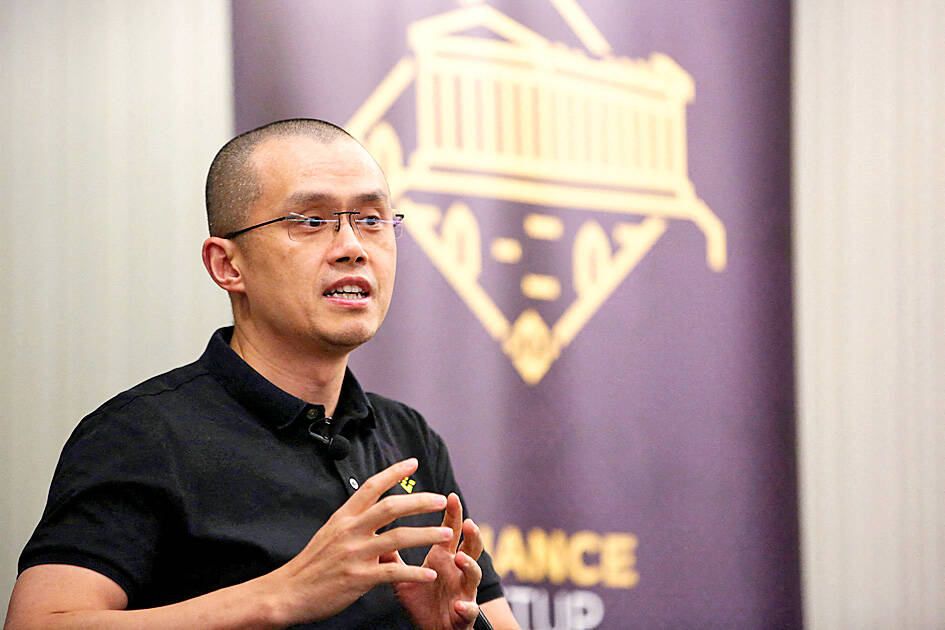The US Securities and Exchange Commission’s (SEC) lawsuit against crypto exchange Binance Holdings Ltd (幣安) and its cofounder and CEO Zhao Changpeng (趙長鵬) injects fresh uncertainty into a sector that is struggling to maintain mainstream relevance.
The SEC accused Binance and Zhao of mishandling customer funds, misleading investors and regulators, and breaking securities rules.
The action adds to the regulatory heat on the largest digital-asset trading platform. It is also another black eye for crypto after a rout last year that contributed to rival FTX’s downfall amid a flurry of fraud allegations.

Photo: Reuters
The market faces an uphill task to restore trust and, meanwhile, investors are moving elsewhere such as artificial intelligence stocks. The overall value of digital coins has plunged to US$1.1 trillion from a peak of more than $3 trillion in 2021, when giant stimulus fueled a COVID-19-era boom in tokens such as bitcoin.
Jane Street Group, Jump Trading and other major trading firms have pulled back from crypto in the US amid heightened regulatory scrutiny. The ensuing decrease in liquidity can pose an obstacle for investors by making it harder to get in and out of digital asset investments in an orderly way.
“The industry will be very different in a year,” Matrixport Technologies Pte Ltd research head Markus Thielen wrote in a note. “Trading volumes will likely drop further and pressure market makers’ revenue projections. Crypto in the US will continue to go through a nuclear winter.”
The SEC in the complaint cited 12 coins as assets that fall under its purview, expanding the list of tokens deemed unregistered securities to span more than US$115 billion worth of crypto. That implies strict rules should apply, which could make the tokens harder to trade if exchanges shy away from listing them.
Digital asset prices yesterday largely held a drop sparked by the lawsuit. An index of the top 100 coins has shed about 4 percent since the complaint hit on Monday. Bitcoin, the largest token, has fallen closer to the US$25,000 level.
The net outflow from the Binance exchange reached US$702 million on Monday, the highest since February, a Dune Analytics dashboard from exchange-traded products issuer 21Shares AG showed.
Binance called the SEC action “disappointing,” saying it had engaged with the agency in good-faith negotiations to settle the matter.
“While we take the SEC’s allegations seriously, they should not be the subject of an SEC enforcement action, let alone on an emergency basis,” the firm said. “We intend to defend our platform vigorously.”
The exchange faces a web of probes, including a lawsuit by the US Commodity Futures Trading Commission.
Action by the US Department of Justice “against Binance and/or related entities or individuals might not be too far behind,” Bloomberg Intelligence senior litigation analyst Elliott Stein wrote in a note.
Outside the US, locations such as Hong Kong and Dubai are seeking to court crypto investment. The EU in April approved the most comprehensive digital asset rules of any developed economy.
That potentially gives crypto firms friendlier places to try and recover from a deep retrenchment and learn the lessons of last year’s crash.
“The lack of US regulatory clarity will drive crypto to other jurisdictions,” Venn Link Partners Pte Ltd founder Cici Lu (陸戈) said.

Semiconductor business between Taiwan and the US is a “win-win” model for both sides given the high level of complementarity, the government said yesterday responding to tariff threats from US President Donald Trump. Home to the world’s largest contract chipmaker, Taiwan Semiconductor Manufacturing Co (TSMC, 台積電), Taiwan is a key link in the global technology supply chain for companies such as Apple Inc and Nvidia Corp. Trump said on Monday he plans to impose tariffs on imported chips, pharmaceuticals and steel in an effort to get the producers to make them in the US. “Taiwan and the US semiconductor and other technology industries

SMALL AND EFFICIENT: The Chinese AI app’s initial success has spurred worries in the US that its tech giants’ massive AI spending needs re-evaluation, a market strategist said Chinese artificial intelligence (AI) start-up DeepSeek’s (深度求索) eponymous AI assistant rocketed to the top of Apple Inc’s iPhone download charts, stirring doubts in Silicon Valley about the strength of the US’ technological dominance. The app’s underlying AI model is widely seen as competitive with OpenAI and Meta Platforms Inc’s latest. Its claim that it cost much less to train and develop triggered share moves across Asia’s supply chain. Chinese tech firms linked to DeepSeek, such as Iflytek Co (科大訊飛), surged yesterday, while chipmaking tool makers like Advantest Corp slumped on the potential threat to demand for Nvidia Corp’s AI accelerators. US stock

The US Federal Reserve is expected to announce a pause in rate cuts on Wednesday, as policymakers look to continue tackling inflation under close and vocal scrutiny from US President Donald Trump. The Fed cut its key lending rate by a full percentage point in the final four months of last year and indicated it would move more cautiously going forward amid an uptick in inflation away from its long-term target of 2 percent. “I think they will do nothing, and I think they should do nothing,” Federal Reserve Bank of St Louis former president Jim Bullard said. “I think the

SUBSIDIES: The nominee for commerce secretary indicated the Trump administration wants to put its stamp on the plan, but not unravel it entirely US President Donald Trump’s pick to lead the agency in charge of a US$52 billion semiconductor subsidy program declined to give it unqualified support, raising questions about the disbursement of funds to companies like Intel Corp and Taiwan Semiconductor Manufacturing Co (台積電). “I can’t say that I can honor something I haven’t read,” Howard Lutnick, Trump’s nominee for commerce secretary, said of the binding CHIPS and Science Act awards in a confirmation hearing on Wednesday. “To the extent monies have been disbursed, I would commit to rigorously enforcing documents that have been signed by those companies to make sure we get